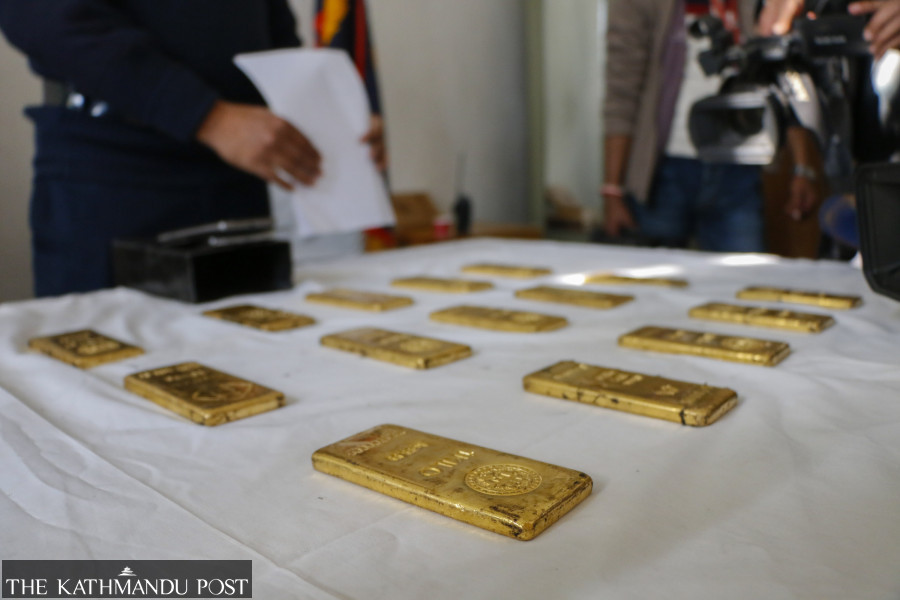National
Government warns Nepali returnees against bringing gold bullion
Officials say migrant workers are being used as carriers by gold dealers to avoid taxes.
Prithvi Man Shrestha
The Department of Customs has advised Nepalis returning from abroad not to bring gold bullion by declaring it as jewelry and warned of legal action against anyone violating the rules.
In a notice issued on November 17, the department said its attention has been drawn to the rising trend of people bringing gold bullion from abroad declaring such gold as jewelry.
According to customs officials, the law allows people coming from abroad to bring only up to 50 grams of gold jewelry without paying customs duty.
The government warning comes amid a slump in foreign currency reserves caused by surging imports and falling remittances.
During the first quarter of the current fiscal year, foreign exchange reserves decreased 5.7 percent to Rs1319.32 billion in mid-October while inflow of remittances, the largest source of foreign exchange earnings, declined by 7.6 percent to Rs.239.32 billion in the review period, according to the Nepal Rastra Bank statistics.
Gold and silver became among the top import items of the country during the first quarter of the current fiscal year. Their import values in the first quarter stood at Rs11.12 billion and Rs 11.99 billion, respectively, according to the Trade and Export Promotion Centre.
Amrit Sigdel, a customs official at the Tribhuvan International Airport, said many Nepalis have been bringing gold bullions from abroad by bending the metal in the form of bangles, among other jewellery.
“From now on, if anyone brings gold bullion by making it look like jewelry, we will take action against such people,” he added.
Only commercial banks are authorised to formally import gold bullion.
According to officials at the department, they have found most people bringing gold bullion are mere carriers who are paid a certain amount for the job by gold racketeers.
“We have information that gold racketeers are using Nepalis, especially migrant workers, as carriers,” said Punya Bikram Khadka, director at the Department of Customs.
He said that the notice was issued as per the instruction of the Finance Ministry.
According to Khadka, such a trend was also exposed when some people were arrested with several gold lockets and gold bangles at a domestic airport.
In September, police arrested two people at Nepalgunj airport with 4kg of gold as they were traveling from Kathmandu to Nepalgunj by a Shree Airlines flight.
According to reports, six gold biscuits weighing around 3.994 kilograms, five gold lockets with Ganesh imprints, one traditional Nepali gold necklace, and one gold bangle weighing 27.49 grams were recovered from them.
In early August, police arrested two migrant workers at the Tribhuvan International Airport for ‘illegal’ possession of 475 grams of gold in the form of eight bracelets and two rings. Police also arrested three Indian nationals from a guesthouse who were allegedly involved in collecting gold from returnee migrant workers.
Khadka said that the government sought to stop the growing misuse of the privilege granted to migrant workers to bring a certain amount of jewelry for their contribution to the economy.
Lately, a surge in imports has raised concerns among authorities as it is having an impact on foreign exchange reserves. During the first quarter of the current fiscal year, imports surged by 63.7 percent to Rs478.52 billion. Though exports also surged by as high as 109.5 percent to Rs65.05 billion, the portion of exports compared to imports, has remained insignificant.
Officials at the central bank and the government are discussing ways to control the surging imports. The government has already taken steps to discourage certain imports, considering them unproductive.
For example, the government recently increased the customs duty on the import of silver. As per the government’s decision, import duty on the precious metal has been fixed at Rs107 per 10 grams, up from Rs84 per 10 gm earlier.
Shivaraj Sedhai, spokesperson at the Department of Commerce, Supply and Consumer Protection, said that there have been discussions on controlling certain imports.
In late October, the central bank, just two days after issuing a circular to provide traders and businesses foreign currency for imports of peas, betel nuts, dried dates, and peppercorn, scrapped the decision. According to reports, the decision was scrapped following pressure from the finance ministry, which was worried about dwindling foreign exchange reserves.
“Importers were complaining that they have not been able to collect the shipments imported in mid-July,” said Sedhai.
In March this year, the government had allowed the import of peas, betel nuts, dried dates and peppercorn until mid-July by setting quantitative limits for each item—1,225,290 tonnes for peas, 227,270 tonnes for betel nuts, 41,995 tonnes for dried dates and 140,082 tonnes for peppercorn.
But the government has not opened the door for the import of these items for the current fiscal year. Sedhai said the government may consider continuing the restriction if there is no improvement in the foreign exchange reserves.
Given this situation, the government has also increased vigilance on the import of gold and silver whose import has surged several times in the first quarter of this fiscal year from just Rs737 million and Rs494.75 million respectively during the first quarter of the last fiscal year, according to the Trade and Export Promotion Centre.
“When gold is imported in large quantities in the form of jewelry to avoid customs duty, the country potentially loses foreign exchange as well as revenue,” said Khadka.




 14.12°C Kathmandu
14.12°C Kathmandu















